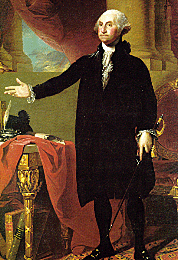

GEORGE WASHINGTON
Biography

“To the memory of the Man, first in war, first in peace, and first in the hearts of his countrymen.” So wrote Congressman Henry Lee in 1799, upon the death of George Washington. Lee, who was better known as “Light Horse Harry” Lee, was a hero of the Revolutionary War and a friend of Washington’s. His famous words accurately described the feelings of Americans for their first president.
Washington’s role in the creation of the United States was almost without equal. He led the American forces during the long and difficult years of the Revolutionary War that won independence from Britain. He presided at the Constitutional Convention that established the framework of the new government of the United States, and then, as its first President, helped determine what form the presidency would take. Having accepted his country’s highest office with reluctance, Washington served two terms and then returned to the life he most loved, that of a farmer and planter.
The Approaching Revolution
All through the 1760’s and into the 1770’s, relations between Britain and its American colonies were growing more strained. Finally in 1774 resentment by the colonists against what they thought was unjust treatment by the British Parliament and by King George III led to open revolt. In this crisis many of the rich planters and merchants remained loyal to Britain. Washington, however, took his stand without hesitation on the side of the American rebels. When Parliament passed the so-called Intolerable Acts punishing the city of Boston for its Tea Party, in which a cargo of British tea was dumped into the harbor, Virginia rallied to Boston’s support.
“Shall we supinely sit and see one province after another fall a prey to despotism?” wrote Washington, as he met with other Virginia Burgesses in Williamsburg to plan measures of resistance. “The crisis is arrived when we must assert our rights or submit to every imposition till custom and use shall make us tame and abject slaves.”
Washington voted for a general meeting of all the American colonies and was sent as a delegate to this First Continental Congress, which met in Philadelphia in 1774. He was also sent to the Second Continental Congress, which met the following year after the outbreak of fighting between British troops and American colonists at Lexington and Concord, Massachusetts. On June 15, 1775, at Philadelphia, Washington was unanimously elected to the command of all American forces. “I do not think my self equal to the Command,” said Washington, but out of a deep sense of duty he accepted, adding that he would serve without pay. He rode off at once to take command of the American troops outside Boston.
Washington as Commander of the Continental Army
For the next eight years Washington was to carry almost the whole burden of the American cause on his broad shoulders. Thirteen colonies not yet a nation, with a population of less than 3 million who were sharply divided among themselves, had defied the greatest military power in the world. Britain had just emerged from a tremendous victory over France. It commanded great wealth, a large population, and a navy that ruled the seas. The British controlled Canada to the north and could count on many supporters in the American colonies.
On October 19, 1781, the British army marched out of Yorktown and stacked its arms in surrender. Yorktown was the last major battle of the war, although nobody quite realized that at the time. In fact, after the victory at Yorktown things took a turn for the worse. The British, however, were just as tired of the war as the Americans. Peace talks began in Paris in 1782, and a final treaty was signed in 1783.
Washington still had to deal with a number of difficult problems. The discontent of soldiers who had not been paid by the Continental Congress threatened to blow up into a rebellion. The various states still acted as if they were independent. Nevertheless, in December 1783, Washington was able to take farewell of the army and the Congress. “I retire from the great Theatre of action,” he said, “and take my leave of all the employments of public life.”
Washington had hoped to retire to Mount Vernon to put his tangled affairs in order, restore his broken fortunes, and enjoy his old age in quiet. But he would not be allowed to do so. He was not only a public figure, he was the most important public figure in the United States. Nothing could really be done without him.







